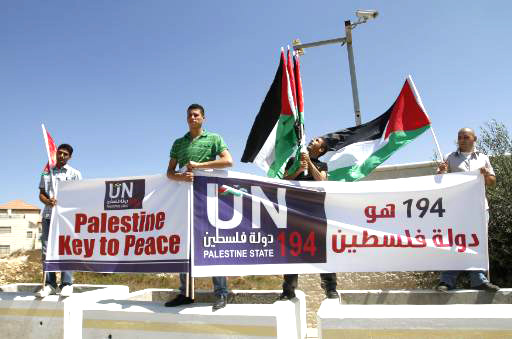IN THE MEDIA
Only one path can lead to two states
November 17, 2011 | Mark Leibler

Mark Leibler
The Age – November 17, 2011
Opinion
A vote for a Palestinian state in the UN will only feed false expectations.
Australians should be proud of the fact that our Prime Minister and Foreign Minister have consistently and publicly supported, with bipartisan agreement, a genuine, negotiated two-state resolution to the Israeli/Palestinian conflict. This is why Australia wisely voted against the admission of Palestine to UNESCO and why Australia should vote against Palestinian ‘statehood’ if and when it comes to the United Nations General Assembly.
Richard Woolcott (“Voting against Palestine may cost Australia a seat on the Security Council”, Nov. 11) fears that Australia’s bid for a United Nations Security Council seat would fail if a negative vote on Palestinian ‘statehood’ is cast at the UN General Assembly. However, he does not argue ‘that we should change policies to secure a vote’. Rather, he suggests that Australia’s support for a unilateral declaration of a Palestinian state will ‘reinforce [the Palestinians’] moral position and progress towards the accepted two state solution’. In my view, this proposition is unsustainable.
The UN General Assembly cannot admit a new state to the UN but can offer symbolic support for a Palestinian state along the 1967 lines, with the eastern part of Jerusalem as its capital. These are the fragile 1949 armistice lines that Israel’s late Foreign Minister, Abba Eban, declared as the ‘Auschwitz’ lines due to the existential threat this could pose to the security of Israel. But this would be a self-defeating strategy. The Palestinians should be encouraged to return to direct negotiations with Israel. Attempting to force Israel’s hand through UN General Assembly resolutions will not lead to peace. Moreover, the kind of recognition likely to be proposed would undermine UN Security Resolutions 242 and 338, and the Camp David Accords, which call for a negotiated outcome and do not predetermine final boundaries.
Symbolic recognition by the UN General Assembly would imply an imposition of international borders on Israel without Israel’s input, including taking parts of its capital, Jerusalem, away from it and giving the parts to a new country. Why feed false expectations which may well contribute to a resurgence of violence?
Furthermore, a state requires control of defined borders. If President Abbas claims control over Gaza, then he acknowledges a partnership with Hamas which is a terrorist organisation committed to Israel’s destruction. Moreover, not only does the Palestinian Authority refuse to recognize Israel as a Jewish state, it has also stipulated that any Palestinian state will be ‘judenrein’, cleansed of all Jews – notwithstanding that ethnic cleansing is specifically forbidden by the UN General Assembly. As well, Palestinian incitement to hatred and violence against Israel and Jews continues in violation of UN resolutions.
While Palestinian leaders tell Western audiences they know that peace requires negotiations with Israel following the UN vote, their Arabic statements tell a different story. The plan is for a campaign of further confrontation and delegitimization using international bodies, courts, mass demonstrations, civil disobedience and other measures to force Israel to concede statehood without a peace agreement and the politically difficult Palestinian compromises this would require. Without essential agreements on security arrangements and such fraught issues as borders, Jerusalem, settlements and refugees, the inevitable outcome would be a more intense and violent conflict, not peace.
The problem is not, as assumed by some, that Israel is unwilling to grant Palestinian independence. In 2000, 2001 and 2008 Israel offered the Palestinians statehood on terms which gave the vast majority of what the Palestinians could reasonably hope for, such as a capital in East Jerusalem, control over holy places, land swaps for any territory Israel would retain and efforts to address the plight of Palestinian refugees. Israel proved its bona fides in terms of territorial compromise in 2005 by pulling entirely out of Gaza – to be met with massive rocket fire in return. Public opinion in Israel today supports a two state outcome in return for genuine peace, as do Israel’s major political parties.
But aren’t Israeli settlements constantly gobbling up West Bank land, making a Palestinian state less and less viable? Absolutely not. No new settlements have been established since 1998, and, since 2003, Israel has been implementing a policy, agreed with Washington, that growth within existing settlements must not expand the area of the settlement. Settlements currently take up less than 2 percent of the West Bank, and that amount is not growing, despite all the headlines about settlements.
The international community should promote an environment which makes a negotiated two state solution more likely. Notwithstanding suggestions to the contrary by Richard Woolcott, this means avoiding steps at the UN which will make it harder for either side to make the necessary, painful compromises in the future.
The Foreign Minister, Kevin Rudd, has repeatedly assured me that Australia’s quest for a Security Council seat will not impact on Australia’s commitment to Israel and to a genuine, negotiated two state resolution. Bilateral negotiations without preconditions, as demanded by the Quartet, is the only constructive path towards such an outcome. Australia’s bid for a UN Security Council is a worthy goal, but in the name of both principle and peace, Australia should oppose any unilateral declaration of a Palestinian state at the UN General Assembly.
Mark Leibler is chairman of the Australia/Israel & Jewish Affairs Council.
See the edited version in The Age: http://www.theage.com.au/opinion/politics/only-one-path-can-lead-to-two-states-20111116-1nj58.html#ixzz1duZv5AUS
Tags: Australasia





